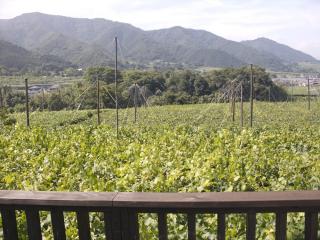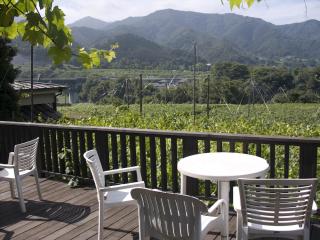Japan's Koshu
POSTED ON 20/02/2010The arrival of group of Japanese winemakers in London last month was the culmination of three years work aimed at convincing them, and latterly us , that there just might be a future for Japanese wine beyond their island nation. Sake , beer and even schochu we expect, but wine? Most of what has until now passed for wine in Japan has either been imported or grape concentrate fermented in Japan, the latter bearing no more resemblance to the real article than Armani made in Taiwan. Most, but not all. With its dynamic restaurant culture, including more sommeliers than any country in the world, the Japanese are taking wine to their hearts. Imports and domestic blends apart, there is a growing appreciation of the genuine home-grown product derived from the native koshu grape.
 Koshu growing in Yamanashi
Koshu growing in Yamanashi
It’s still a tiny industry with just 480 hectares supplying the 80 wineries in the picturesque Yamanashi Province an hour and a half by rail north-west of Tokyo. Koshu was a favourite of the Shogun during the Edo period of the 17th to 19th centuries. An attempt to reinstate it by sending two ex-samurai to Bordeaux in the 1870s to study winemaking led to the beginnings of the modern industry. It’s only recently though that koshu has started to enjoy a surge in popularity. One winery, Grace, even employs the services of a top Bordeaux white wine consultant, Denis Dubourdieu.
As well as competing for space normally occupied by rice paddies, table grapes and people, the vigorous, pink-skinned koshu has to surmount the challenges of humidity, rain and fertile volcanic soils. As a result, the vine looks like a small tree with its branches and leaves spreading out like a carpet on a high pergola, ‘according to the height of the owner’, says Haruo Omura of Rubaiyat Marufuji with a nod and a wink. Koshu produces appetizing wines that are fresh, light and mostly dry, sometimes floral, with a passing resemblance to chablis or muscadet and the moderate alcohol and mouthwatering acidity of riesling.
The fact that koshu is self-evidently suited to Japan’s superfresh fish gastronomy encouraged Lynne Sherriff MW, a consultant to the Yamanashi winemakers (koshuofjapan.com), to show off 15 koshu wines at London’s Kyoto-style Umu restaurant. All were dry, mostly made in stainless steel with just a couple fermented in barrel. The traditional kaiseke tasting menu, prepared by the head chef Ichiro Kubota, contained six fish based courses, varying from the simplicity of a brill, bluefin tuna and squid sashimi, to a bewildering assortment of 10 bite-sized bonnes bouches, each an explosion of flavour: black bean, herring roe, baby sardine, prawn, sea kelp, white fish, halibut, kinkan citrus, water chestnut and sea cucumber ovary.
The wines were served in groups of three, with a variety of styles from drier and lighter, to fuller and richer and, in the case of the oak-fermented whites, smoky. Each group had its star, most notably Grace Winery’s water white chablis-like, mineral 2008 Koshu, a fresh pear, Alsace-like 2009 Yamanashi Koshu and a savoury, dry 2008 Diamond Koshu. The most encouraging aspect of the tasting was a demonstration of how appetizing and well-matched the best of these subtle dry whites were with the food. We may not be seeing Japanese koshu on supermarket shelves or in the high street any time soon, but there’s no good reason why their appearance, when it happens, need be confined to Japanese restaurants alone.
 Yamanashi: a view from the terrace
Yamanashi: a view from the terrace
Something For the Weekend
2003 Viña Decana Reserva, Utiel-Requena
A blend of Spain’s tempranillo with a smattering of French varieties, this is a smooth, mellow, cherryish red from Spain’s south with some of the vanilla undertones of rioja and a moreish drinkability at an affordable price. £4.99, Aldi.
Under a Tenner
2008 Ebenezer & Seppeltsfield Shiraz, Barossa Valley
From St.Hallett of Old Block Shiraz reputation, this chip off the old block punches above its weight with vanilla and coconut oak aromas, and powerfully concentrated, ripe blackberry fruit underscored by a beguiling smokiness. £9.99, Marks & Spencer.
Splash Out
2007 Château Ste Michelle Cold Creek Chardonnay
This stylish chardonnay from Washington State could so easily be mistaken for top-flight Meursault with its complex less-derived nuttiness and finely balanced, opulent, peachy fruit flavours. £19.99, Wholefoods, Kensington; Berkmann Wine Cellars (02076094711; £17.99 for Independent readers collecting).

